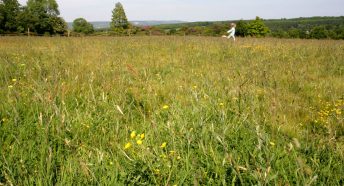'We fundamentally disagree with the inspector’s conclusions and believe key parts of the Local Plan requirements have been incorrectly interpreted': Sevenoaks begins judicial review proceedings in planning battle

Sevenoaks District Council has taken its challenge of the Planning Inspectorate to the next level by beginning judicial review proceedings.
The move comes in response to a government-appointed inspector’s refusal to endorse the council’s new Local Plan.
The inspector, Karen Baker, wrote her final report on the examination of the Plan on March 2, concluding it was not legally compliant in respect of the council’s duty to cooperate.
She had advised the council of her view in a letter to the local authority in October in which she wrote: “I have significant concerns about a number of aspects of the Plan, both in terms of legal compliance and soundness.
“My main concern relates to the lack of constructive engagement with neighbouring authorities to resolve the issue of unmet housing need and the absence of strategic cross-boundary planning to examine how the identified needs could be accommodated.”
However, not only did the council, which is being told its Plan should include the building of 11,312 homes, refuse to withdraw it but its leader, Peter Fleming, gave a fierce response to the inspector’s letter:
“It is clear to me the way this has been handled calls into question the integrity of the whole Plan-making system in this country…
“To call into question an evidence-led approach comes to the root of our concerns with the actions of the inspector. If we are not to follow the evidence to make our Plan then the government may just as well dictate how many homes an area should have and then pick sites, we need to put an end to the thinly veiled charade that Local Plans are in any way locally led.”
Cllr Fleming is now making good on his warning that the council would not back down: “I will be writing to the Secretary of State on this matter and urgently asking him to intervene,” he said in October.
“It appears something is very wrong with the system if a council with its communities works hard for four years to produce an evidence-based Plan that delivers housing, jobs and infrastructure investment, whilst protecting the environment, only to be halted by a single individual.
“We will not be withdrawing our Local Plan and the inspector will produce her report in due course. We will then take the strongest action open to us.”
The council says its Plan submission included more than 800 pages of evidence detailing how it had worked with neighbouring authorities during its production of the Plan. It adds that those councils and other organisations involved in its development supported the council’s evidence and approach.
And on Friday last week (April 17) Cllr Fleming said: “Taking legal action is not something we would undertake lightly and demonstrates we are serious about standing up for our residents and our cherished environment, against what we believe is a fundamental failure by the Planning Inspectorate to take account of the weight of evidence in front of them.
“Working with landowners, communities and developers, our new Local Plan put forward innovative solutions to deliver almost 10,000 homes and improved infrastructure while protecting nearly all of our Green Belt. It’s a huge frustration that, after so much work, we cannot take our Plan forward at this time.
“In our view, concluding we failed to cooperate with neighbouring councils was the only way to halt the examination. We reject this. We gave the planning inspector detailed evidence of our work with our neighbours and, from the start, they said they couldn’t accommodate the homes we could not deliver.”
Julia Thornton, cabinet member for development & conservation, added: “Our Local Plan is the first in the country to be assessed under a new planning framework. We believe, whilst this is not the reason the inspector has given, failing to meet the government’s housing figure would potentially impact on subsequent Local Plans across the country.
“If the inspector did have significant concerns over our duty to cooperate, these should have been raised soon after we had submitted our Plan, not months later. We fundamentally disagree with the inspector’s conclusions and firmly believe key parts of the Local Plan requirements have been incorrectly interpreted.
“We feel have no choice but to take this course of action.”
Robert Jenrick, Secretary of State for Housing, Communities and Local Government, which is responsible for the Planning Inspectorate, will have the chance to respond before a judge decides if the case should proceed.
Wednesday, April 22, 2020
- A number of important documents have yet to emerge. For example, a rigorous transport plan and a finalised air-quality assessment. The latter is critical given that allocations at Teynham will feed extra traffic into AQMAs.
- There seems to be no coherent plan for infrastructure delivery – a key component of the plan given the allocations being proposed near the already crowded Junction 7.
- There seems to have been little or no cooperation with neighbouring boroughs or even parish councils within Swale itself.
The removal of a second consultation might have been understandable if this final version of the plan were similar to that being talked about at the beginning of the consultation process. It is, however, radically different in the following ways:
- There has been a major shift in the balance of housing allocations, away from the west of the borough over to the east, especially around the historic town of Faversham. This is a move that raises many concerns.
- A new large allocation, with accompanying A2 bypass, has appeared around Teynham and Lynsted, to which we are objecting.
- Housing allocations in the AONB around Neames Forstal that were judged “unsuitable” by the council’s own officers have now appeared as part of the housing numbers.
- Most of the housing allocations being proposed are on greenfield sites, many of them on Grade 1 agricultural land – a point to which we are strongly objecting.
Concerns about the rush to submit the plan
The haste with which the plan is being prepared is especially worrying given the concentration of housing in Faversham. If the town is to take a large amount of new housing, it is imperative that the policies concerning the area are carefully worked out to preserve, as far as possible, the unique nature of the town. The rush to submit the plan is likely to prove detrimental.
As Swale does not have a five-year land housing supply, it is open to speculative development proposals, many of which would run counter to the ideas contained in the current plan. Some are already appearing. This is a common situation, and one that, doubtless, is a reason behind Swale’s haste.
Our overriding fear, however, is that this emphasis on haste is ultimately going to prove counterproductive. This is because it is our view that the plan, in its current form, is unlikely to pass independent examination. We are urging Swale to listen to and act upon the comments being made about the plan and to return the plan to the council with appropriate modifications before submitting it to the Secretary of State.
Essentially, this means treating the current consultation not as the final one but as the ‘lost’ second consultation.
The consultation ends on Friday 30 April and we strongly urge residents to make their opinions known if they have not already done so.
Further information








